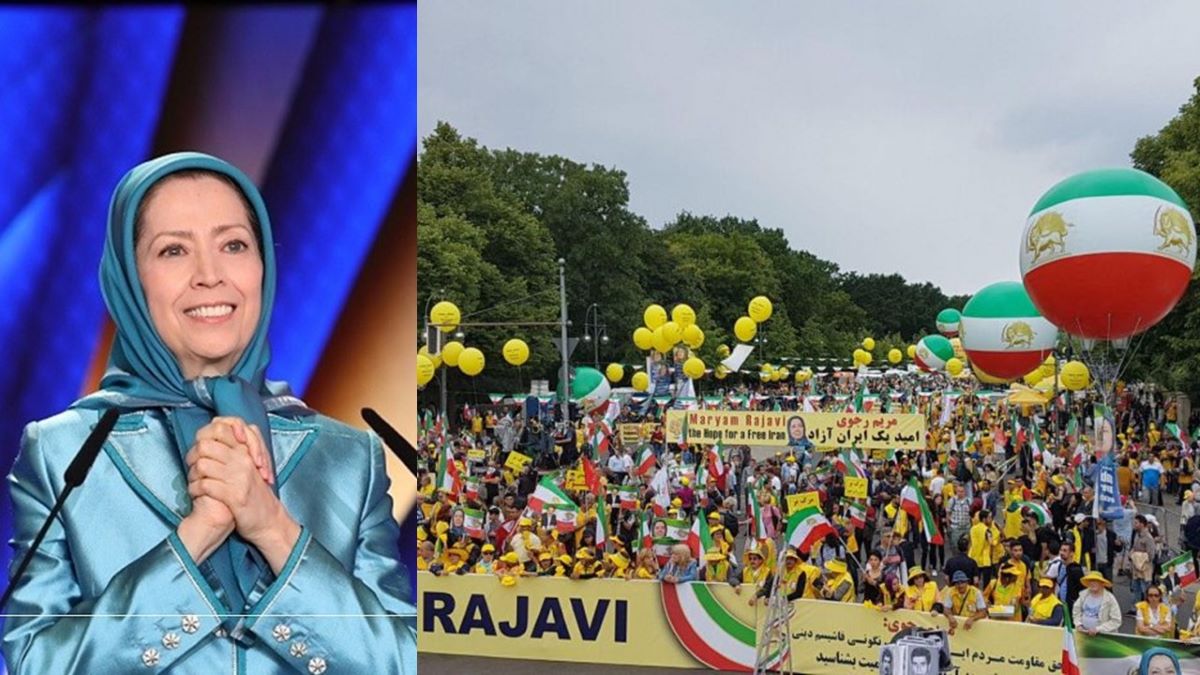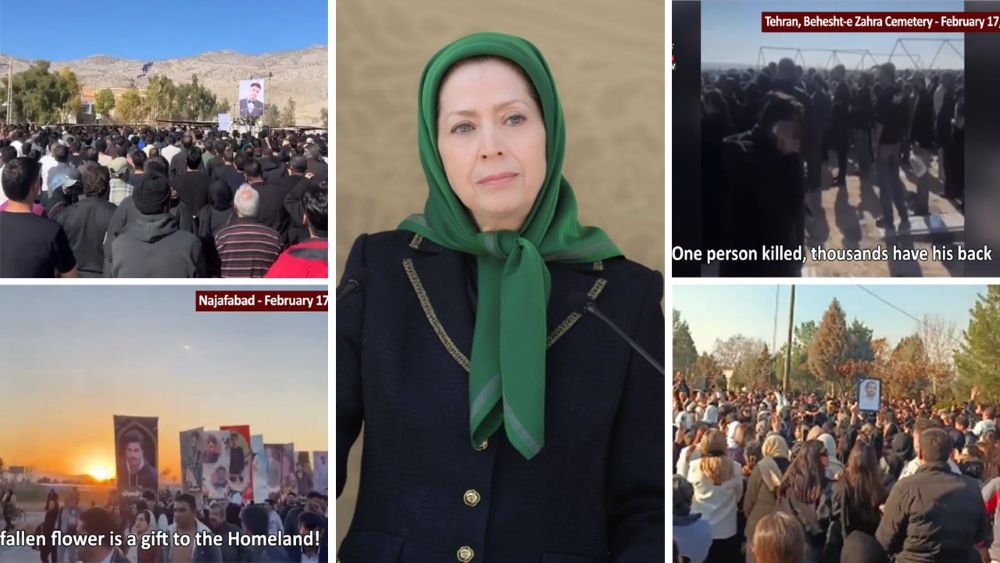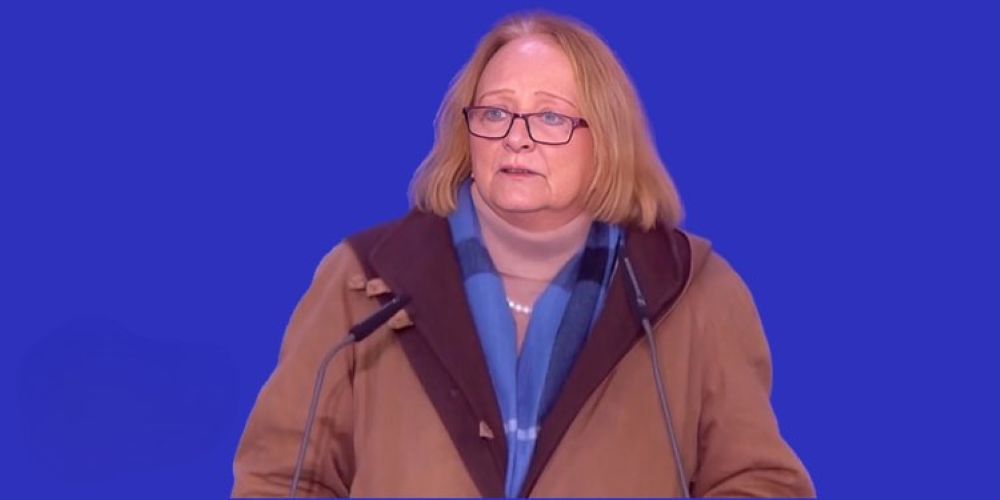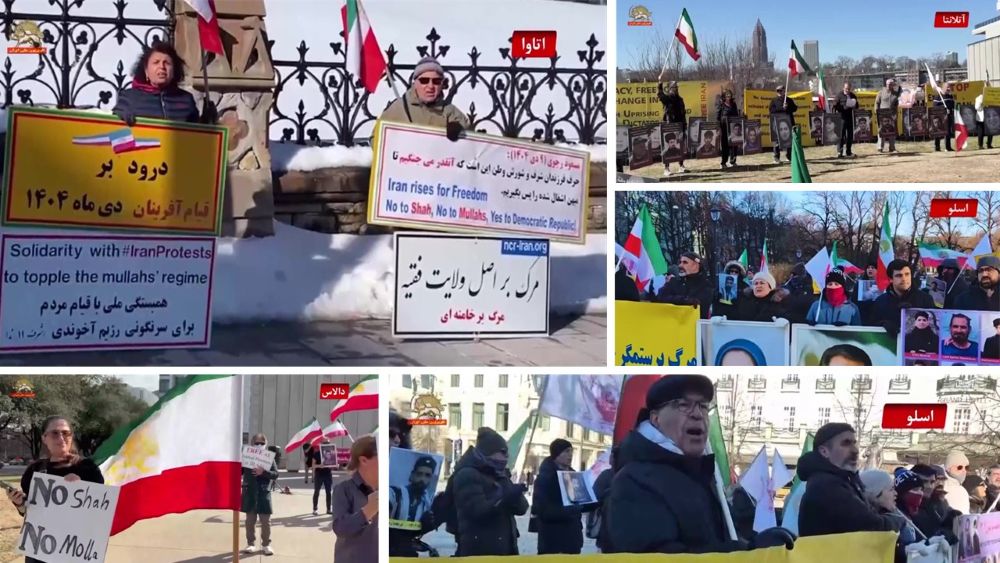A group of 30 distinguished American leaders has issued a statement condemning the terrorist activities of Iran’s Islamic Revolutionary Guard Corps (IRGC) and Quds Force, which have been documented across Asia, Europe, and both North and South America. This has reinforced Tehran’s reputation as the world’s leading state sponsor of terrorism.
The statement endorses Maryam Rajavi‘s Ten-Point Plan, which she proposed as President-elect of the National Council of Resistance of Iran (NCRI), as an ideal framework for drafting a new Iranian constitution to address future challenges.
The statement highlights the elimination of Qassem Soleimani and the sudden death of Ebrahim Raisi as evidence that no one in the fundamentalist regime is untouchable. It implies that just as these individuals met their end, so too will the regime itself.
Further, the statement criticizes the Joint Comprehensive Plan of Action (JCPOA), asserting that the Iranian regime never adhered to it. Instead, tens of billions of dollars returned to Iran under the agreement were used to fund weapons against Iranian citizens and the West, as well as to support domestic and international terrorist activities.
The signatories emphasize that the brutal legacies of the Pahlavi regime, inherited by his son Reza, and the current regime’s crimes against humanity must never be forgotten. These atrocities should be remembered by future generations to prevent history from repeating itself. The sacrifices and heavy toll paid by the victims are too significant to be forgotten.
The statement concludes with a strong message of support for the Iranian people: “The future of Iran belongs to the Iranians. All democracies and freedom-loving people everywhere should stand with them. Today, we stand with them.”
The full text of the statement follows:
June 24, 2024
American Statement in Support of a Free Iran
In one of the darkest hours of history, President Franklin Roosevelt announced four freedoms that are the birthright of all people throughout the world: of expression, of worship, from want, and from fear. Anchored in the American Constitution and its Bill of Rights, those four freedoms rallied America and the Allies to victory in World War II.
For the past seven decades, these four freedoms have been denied to the Iranian people. In 1979 the people of Iran brought an end to oppression that had commenced in 1953 when Shah Mohammad Reza Pahlavi and his terrorist secret police, SAVAK, gained supreme power. Unfortunately, the Iranian quest for democracy was hijacked by the religious extremists who remain in power to this day.
Ninety-five percent of the citizens living inside Iran have never been able to exercise their basic human rights of expression and worship, without fearing arrest, imprisonment, torture, and death at the hands of the fundamentalist government in Tehran. Morality police, undercover police, the Islamic Revolutionary Guard Corps (IRGC), the Ministry of Intelligence and Security (MOIS), and numerous other organizations have spied upon and terrorized the population. The 2022 arrest and physical beating that resulted in the death of imprisoned Jina Mahsa Amini exemplifies the extreme brutality of the Iranian government. Amini was arrested because of the way she wore her headscarf.
The Persian Empire was once one of the most advanced societies in the world. Its accomplishments in medicine, science, literature, and architecture were highly respected. Today, the government in Tehran remains in power only through its repression and brutality. Other than dedicating itself to the development of weapons of mass destruction, the fundamentalist government has not made a single advancement in technology or science.
Meanwhile, it has achieved the well-deserved title of “The Number One Nation-State Exporter of International Terrorism.” Terrorist activities by the IRGC and Quds Force have been investigated and proven throughout Asia and Europe, as well as in North and South America. If not for the diligent work of Belgian, French, and German Police, the MOIS may have blown up a Free Iran Rally in 2018. Many of the signatories of this statement attended that event. At the same time, Iran was caught planning two other bombings in Europe, both in Albania. All of these occurred while the P5+1 Nuclear Accord was in full effect.
In the Middle East, the anarchy that stretches across Iraq, into Syria, Lebanon, Gaza, and south to Yemen is fueled by Tehran. Instead of dedicating financial resources to improving the lives of Iranian citizens, the fundamentalists use these resources to oppress the population, acquire nuclear weapons, and arm terrorist organizations, including Hezbollah and Hamas.
Hamas could not have launched the October 7, 2023, complex attack on Israel involving 3,000 rockets, paraglider assault forces, vehicles, and ground troops without receiving training, armament, and intelligence coordination from Iran. To Iran, Hamas is an expendable Sunni force, as are the Palestinians of Gaza. Hezbollah has been held back until now by Tehran from total engagement against the Israel Defense Forces. Tehran knows Hezbollah’s chances will be about the same as the three hundred rockets and drones Iran sent against Israel, which suffered a 99.9 percent failure rate. Without IRGC training, arming, and funding, Houthi militias in Yemen would not be able to continue terrorizing Red Sea shipping lanes. IRGC resources and proxies routinely attack – and sometimes kill – American military and civilian personnel in Syria, Iraq, and aboard naval and merchant ships. Meanwhile, Iran hides its leading role and operates a disinformation campaign against Israel in hopes of undermining the Abraham Accords.
Unrest is rising once again in Iran, as evidenced by the recent surge in arrests. In their social media exchanges, the people of Iran know what is happening, and how the fundamentalists are viewed throughout the world. They recognize it is the clerical dictatorship, not democratic nations, that prevents Iran from becoming part of the 21st Century.
A change in this perverse system of government must come and it requires a coordinated effort. Otherwise, the fundamentalist regime will just keep arresting, imprisoning, torturing, and executing free-thinking men and women. The elimination of Qassem Suleimani and the sudden death of Ebrahim Raisi demonstrate that no one in this fundamentalist regime is invincible. Just as their days came to a sudden end, so will the regime’s. Once the Islamic Republic is removed from power it must go the way of the monarchy. Neither must ever again be allowed to deny self-government to the people of Iran.
Likewise, nations of the world must stop ignoring the cries of the Iranian people. During the 1981, 1988, 1999, 2009, 2013, 2017, 2019, and 2022 protests and brutal crackdowns the the world stayed silent. In 1988, when 30,000 Iranian people were executed for their views of the regime, the regime lied to the UN investigator about this major crime against humanity. Now that the truth is known, Western governments have a duty to pursue accountability against top regime figures. The passive stance of the United States in recent years has shown that it is more interested in restoring the deeply flawed Joint Comprehensive Plan of Action (JCPOA), otherwise known as the Nuclear Accord, than in addressing the horrors being suffered by the Iranian people and finding ways to stop the continuing export of international terrorism.
It is now recognized that the JCPOA was never going to be honored by Iran. The tens of billions of dollars freed up from under the Accord went straight back to Iran to be used in funding weapons to use against its own people and the West, as well as funding national and international terrorist operations. Today, Iran is on the edge of developing nuclear weapons. Once the fundamentalists have nuclear weapons, regional and global security will
be irreparably damaged.
This is why it is more important than ever for the people of Iran to reclaim their heritage and their future, to replace anarchy with a government of their choosing. An interim Constitution should already be in place. A Constitution should be dedicated to providing all citizens with the four freedoms identified by President Roosevelt. The rule of law should equally apply to all, regardless of ethnicity, religious preference, gender, or any other discriminating factor. An excellent starting point for the development of an Iranian Constitution to meet the challenges of the future is the President-elect of the National Council of Resistance of Iran Maryam Rajavi’s Ten Point Plan.
The Iranian reign of terror created by Shah Mohammad Reza Pahlavi’s monarchy, a legacy inherited by his son Reza, and the crimes against humanity of the Islamic Republic, must never be erased from history. Knowledge of the shared brutality by these dictatorships must be remembered and passed down through the generations to help ensure that history does not repeat itself and that the memories of those victimized are preserved. The price they paid was too high for their story and sacrifice to be forgotten.
Iran’s future belongs to its citizens. All democracies and freedom-loving people everywhere must stand with them. We do so today.
Amb. J. Kenneth Blackwell – Former U.S. Representative, United Nations Human Rights Commission
Hon. Lincoln P. Bloomfield, Jr. – Former Special Envoy and Asst Sec State
Colonel (Ret.) Thomas Cantwell – Former U.S. Military Commander of Camp Ashraf
Hon. Linda Chavez – Former Assistant to the President for Public Liaison; Chairman of the Center for Equal Opportunity
Colonel (Ret.) John Cirafici – Former Defense Attaché, Algiers
Gen. (Ret.) James Conway – Former U.S.M.C. Commandant Lt. Gen. (Ret.)
David Deptula – Former Deputy Chief of Staff for Intel, Surveillance, and Reconnaissance, U.S. Air Force
Hon. Newt Gingrich – Former Speaker of the U.S. House of Representatives
Hon. Marc Ginsberg – Former U.S. Ambassador to Morocco
Hon. Porter Goss – Former Director of C.I.A., Former Chairman of House Intel Committee
General (Ret.) James L. Jones – Former U.S.M.C. Commandant, NATO Commander, National Security Advisor to the President
Hon. Robert Joseph – Former Under Secretary of State for Arms Control and International Security
Hon. Patrick Kennedy – Former U.S. Congressional Representative, Rhode Island
Colonel (Ret.) Mark Martin – Former U.S. Military Commander of Camp Ashraf
Hon. Michael B. Mukasey – Former U.S. Attorney General
Brig. Gen. (Ret.) David D. Phillips – Former U.S. Military Commander of Camp Ashraf
Hon. Ted Poe – Former U.S. Congressional Representative, Texas
Hon. Mitchell B. Reiss – Former Ambassador, Special Envoy to the Northern Ireland Peace Process
Hon. Tom Ridge – Former Pennsylvania Governor, U.S. Secretary of Homeland Security
Hon. John Sano – Former Deputy Director C.I.A. National Clandestine Service
Hon. David Shedd – Former Acting Director of the Defense Intelligence Agency
Professor Ivan Sascha Sheehan, Ph.D. — Associate Dean, College of Public Affairs, University of Baltimore
Professor Alan Dershowitz – Professor of Law, Harvard University
Hon. Louis J. Freeh – Former Director Federal Bureau of Investigation
Colonel (Ret.) Wesley M. Martin – Former Senior Antiterrorism Officer, Coalition Forces – Iraq
Hon. R. Bruce McColm – President, Institute for Democratic Strategies
Colonel (Ret.) Gary Morsch – Former Senior Medical Officer at Ashraf
Hon. Eugene R. Sullivan – Retired Federal Judge
Hon. Robert Torricelli – Former U.S. Senator, New Jersey
General (Ret.) Chuck Wald – Former Deputy Commander U.S. European Command




